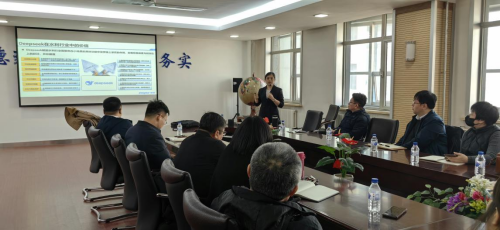To further advance the development of smart water conservancy, broaden the research horizons for faculty and students, and promote technological innovation and practical applications in the field of artificial intelligence in water conservancy, the School of Hydraulic Engineering invited Dr. Sui Bin, Chief Solution Architect for the Water Conservancy Industry of Inspur Group’s Water Conservancy Division and Senior Consultant to the Ministry of Water Resources, to deliver a technical exchange report titled “Deepseek Empowering Smart Water Conservancy Construction” on March 7th.

During the report, Dr. Sui Bin elaborated on five key aspects: the development history of smart water conservancy, the value of Deepseek in the water conservancy industry, the overall architecture and critical components of smart water conservancy, AI business scenarios in water conservancy, and innovative research directions leveraging large-scale AI models. He provided an in-depth yet accessible introduction to the innovative applications and vast potential of Deepseek technology in smart water conservancy construction. Through real-world case analyses and technical demonstrations, Dr. Sui vividly showcased the exceptional performance of AI technology in flood prediction, water resource management, and the construction and maintenance of water conservancy projects. This gave faculty and students a clearer understanding of the broad application prospects of this technology in the water conservancy field.

During the interactive session, faculty and students actively raised questions and engaged in in-depth discussions with Dr. Sui on technical challenges in smart water conservancy construction, Deepseek’s application scenarios for Deepseek, and future trends in artificial intelligence for water conservancy. Dr. Sui patiently answered each question, sharing valuable experiences and unique insights from her research and professional experience. The atmosphere was academically rigorous, and the participants expressed that they had gained significant insights.
The successful hosting of this technical exchange session not only provided faculty and students with a valuable opportunity to engage in face-to-face learning with industry experts and broaden their academic perspectives, but also laid a solid foundation for the institute to strengthen industry-academic collaborations with leading enterprises like Inspur Group. The institute will seize this event as an opportunity to actively promote the application and innovation of AI technology in water conservancy education and research, contributing expertise and solutions to cultivating high-quality, application-oriented talents who are equipped to meet the demands of smart water conservancy construction in the new era.


